|
|
Post by TheWallsScreamedPoetry on May 3, 2006 9:44:18 GMT
|
|
|
|
Post by TheWallsScreamedPoetry on May 3, 2006 10:11:53 GMT
see also:‘Hello I Love You’....... Doors Icon?
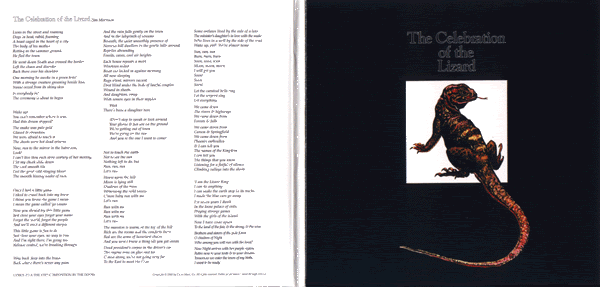
COTL Threads
The Doors unhinged..Soft Parade cause & effect
newdoorstalk.proboards.com/index.cgi?board=concert&action=display&thread=2197
The Lost Doors Album: Celebration Of The Lizard!
newdoorstalk.proboards.com/index.cgi?board=concert&action=display&thread=1572
COTL thoughts on the studio attempt?
newdoorstalk.proboards.com/index.cgi?board=concert&action=display&thread=1424
The Doors: Waiting For The Sun
One night recently the Mothers were performing "Plastic People Louie Louie" when Frank Zappa stumbled onto the monologue that graces "The End" ("he took a face from the ancient gallery and he walked on down the hall ..."). It was terribly funny, and it was nice to see Zappa go through the Morrison changes with an utter lack of seriousness, if only because Morrison himself could use some levity occasionally. Listening to the new Doors' album, Waiting For The Sun, reminded me of Zappa and also how good the first Doors album was; yet after a year and a half of Jim Morrison's posturing one might logically hope for some sort of musical growth, and if the new record isn't really terrible, it isn't particularly exciting either.
The group, as always, is tight: Manzarek does some nice things on keyboards and Krieger acquits himself quite capably on guitar; the rhythm section (particularly Densmore) leaves something to be desired in the way of swing, but at least everybody is together. The album's songs vacillate between the trivial and the neo-Freudian, reaching in some cases new depths as far as lyrics go: "Summer's almost gone, summer's almost gone, we had some good times, but they're gone ..." But the real problem is Morrison, for the Doors have come to be structured around him: there are no extended solos to speak of, which is a pity considering Manzarek's not inconsiderable skill. On this album Morrison doesn't seem to sing as well as on the first Doors' release, but more important is his lack of subtlety: as S. Leon Sultan has pointed out, "The Unknown Soldier" is about on a par with Eric Burden's "Sky Pilot."
There are of course some good tracks: "Spanish Caravan" features some beautiful Krieger classical guitar work, and is well-arranged; "Not to Touch the Earth" (part of a longer "theater piece," "The Celebration of the Lizard") also has its moments, and in spite of its lyrics the music to "Summer's Almost Gone" is highly evocative, with Krieger's slippery bottle-neck guitar effectively embellishing the song. "Hello, I Love You" and "We Could Be So Good Together" are pretty thin fare, while the marriage of Morrison with the work song ("My Wild Love") is somewhat awkward. There is some nice Manzarek harpsichord on "Wintertime Love" (a waltz), but nothing of real substance, and (in case anyone wondered) Morrison shows on "Yes, the River Knows" that he is incapable of sustaining a ballad. Then there is the album's "hard" rhythm and blues number, "Five to One," where Morrison manages to sound like a combination of Barry Melton, Wolfman Jack and Conway Twitty while the rhythm section chugs through the changes.
Waiting for the Sun is a respectable, if unimpressive, third album; it at least represents an advance over Strange Days (which had the knack of sounding like the first Doors album, not only as good). Nevertheless the Doors are not a particularly exciting hard rock band and Morrison is something like rock music's equivalent to Rod McKuen. Whether all this adds up to the praise that has been heaped on the Doors in some circles is open to question. As for the music, great rock it isn't—but then Morrison is supposedly our generation's sex symbol. Anyway the cover is pretty. (RS 18)
JIM MILLER from Rolling Stone September 1968
Waiting for the Sun
After a brilliant debut album and the worthy follow-up Strange Days, the Doors found themselves one of the biggest acts in pop music. At concerts, fans screamed for singer Jim Morrison with beatlesque fervor. An educated, thinking man, Morrison understood with withering clarity the superficiality of his stardom that had nothing to do with music. He rebelled hard against the adulation, manifesting contempt and feelings of unworthiness by constant, absurdly heavy drinking. That cheers for his new inebriated buffoonery on stage got even louder didn’t help--Morrison devolved into a cartoonish stock character egged on to further outrageousness at every gig.
When the time came for the third Doors album Waiting for the Sun, Morrison couldn’t pull it together, arriving at the studio hours late, once famously passing out and pissing himself at the microphone. “Jim was useless 99-and-a-half percent of the time,” producer Paul Rothchild said later. “What you hear on that record is half of one percent.” Still, Rothchild pulled a pretty decent LP out of the mess. He tapped into Jim’s anger to make “Five to One” an effective anti-hippie anthem, as a clearly drunk Morrison growls “You walk across the floor with a flower in your hand/trying to tell me no one understands” provocatively contradicts the earlier “Unknown Soldier.” In this, one of the most explicit anti-war songs of the sixties, Morrison is literally shot by firing squad, which implies the same end result as sending the boys off to Saigon.
“Hello, I Love You” is a commercial sugar-coated treatment of a demo from 1965, directly copping the Kinks’ “All Day and All of the Night.” It predictably went to #1, but sorely disappointed fans that saw the group as “artists” as newly defined by the Beatles. “Love Street” is kitschy jazz about Jim’s girl Pam; “Summer’s Almost Gone” is the final gem from Morrison’s initial burst of creativity in 1965. Robbie Krieger’s contributions are strong, though “Wintertime Love,” the again season-themed follow-up to the previous number seems a bit contrived. “Spanish Caravan” features some dandy guitar work; and “Yes, the River Knows” is a beautiful guitar-piano duet with Ray Manzarek, as Morrison does his best Sinatra.
Every previous Doors album closed with an epic, and this one was to be the most ambitious of all. “The Celebration of the Lizard” is a grisly 110-line surrealistic odyssey through the grim landscape of Morrison’s mind. But in his condition, Jim couldn’t pull it off. Only one section made the grade, assaulting teeny bop listeners with “the minister’s daughter’s in love with a snake” and “dead president’s corpse in the driver’s car” as Manzarek beat the Hammond with his fists—-a far cry from “Hello, I Love You”
The Doors haven’t aged well, but every note and line from this album like the others is no doubt indelibly etched in the mind of millions of former adolescent males like your humble reviewer. As far as this LP goes, it’s a metaphor for Morrison’s contrasts, soft-spoken intellectual one moment, raving asshole the next. It also marks the beginning of the end for one of rock’s greatest stars. He was 27 years old at the time.
Keno's Classic Rock n Roll Web Site
By Zack Taylor November 5, 2004 Rating: 7.0
Waiting For The Sun
"The new album from The Doors, Waiting for the
Sun, is that difficult third LP which seems to thwart
a number of contemporary pop groups.
The Doors have succeeded.
Their first two LPs, The Doors and
Strange Days, were quite similar both in structure and in
mood. Each contained an eleven-minute fantasy number
and some shorter songs whose fabric was trimmed from
nightmarish visions and sexual images. Both were more
grotesque than pretty. Both also were powerful enough to establish The Doors as the hottest group in the United States.
Waiting for the Sun contains the fewest snakes, the least ugliness, the lowest number of freaks and monsters, and the
smallest amount of self-indulgent mysticism of the trio of
Doors' LPs. They have traded terror for beauty and the
success of the swap is a tribute to their talent and
originality.
by Pete Johnson
The Philadelphia Inquirer
|
|
|
|
Post by TheWallsScreamedPoetry on May 4, 2006 13:26:32 GMT
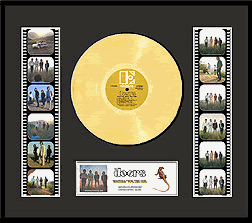 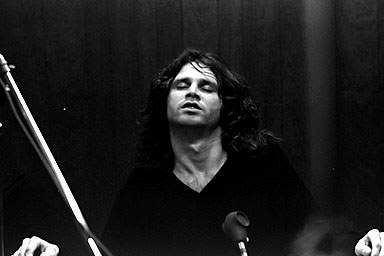 The Doors - Waiting For The Sun The Doors - Waiting For The Sun It's almost as unloved as the album that would follow it and alongside Led Zeppelin's Houses Of The Holy, is now part of a Trivial Pursuit question but in accepting that Waiting For The Sun lacks both the drama and purpose of either The Doors or Strange Days, it can still be thought of as an album of cracking pop songs and ballads, including some of the best the band ever recorded. Showing, however, that Jim Morrison rode his luck a little too far, the record sleeve shows that Waiting For The Sun, as eventually issued, was only part of the album the singer had intended to release. During the band's early life in the clubs of Los Angeles, The Doors had worked up two epics - The End and When The Music's Over that were recorded for The Doors and Strange Days, respectively. The band's fourth album would see The Soft Parade added to that list but by the time of Waiting For The Sun, Morrison had written a suite of songs that would dwarf all of the band's other efforts - The Celebration Of The Lizard. Leading off against Morrison's own legend, this piece, which varied slightly around seventeen minutes or thereabout, was formed out of seven separate songs - Lions in the Street, Wake Up, A Little Game, The Hill Dwellers, Not To Touch The Earth, Names Of The Kingdom and The Palace Of Exile - and, given the inclusion of the lyrics presented in the sleeve notes to this album, featured Morrison as a shaman intent on taking his followers through empty cities, surrealist adventures and onwards, through exile, to an invasion of his tome town at dawn. As with both The End and When The Music's Over, The Celebration Of The Lizard was a patchy effort with as many great moments as there are those that drag through Morrison's dull lyrics - "I am the lizard king, I can do anything...I made the blue cars go away" - and whilst the review of Absolutely Live! will look at it further, it's noted here for Paul Rothchild making it clear to the band that, on this album at least, The Celebration Of The Lizard was one epic too far and would have dragged a clutch of pop songs and ballads into something that both critics and fans would have torn the band apart over. With only one song out of the seven making it onto the album - Not To Touch The Earth - Waiting For The Sun feels incomplete and, at a shade over 33mins, which includes the four minutes of Not To Touch The Earth, is shorter than either of the band's two earlier albums. As the album jumps between pop, ballads, acapella chants, psychedelia and calls to arms, Waiting For The Sun all too clearly lacks something to give it form and to bind it into an album. And therein lies the problem with Waiting For The Sun for, whilst both of the earlier albums and the three later ones present something of a complete sound, be it the psychedelic music hall of their debut, the come down of Strange Days or the hard rock of Morrison Hotel/Hard Rock Cafe, this third album does much but gets nowhere. Back in July 1968, Waiting For The Sun was seen as a stuttering arrest by The Doors and effectively halted their increasingly successful profile but unlike The Soft Parade, which is generally thought of as a dud even now, time has been kind to this album. Without ever trying too hard, Waiting For The Sun really isn't a bad album, beginning with Jim Morrison's homage to The Kinks, Hello, I Love You. Morrison never hid the similarities between this song and All Day And All Of The Night but, as with LA Woman's Love Her Madly, Hello, I Love You feels out of place. Then again, as the point has already been made, everything feels out of place on Waiting For The Sun, whether the sun-kissed pop of Love Street, the warm waltz of Wintertime Love, they psychedelic flamenco of Spanish Caravan or the end-of-war soundtrack of The Unknown Soldier. And yet, Waiting For The Sun does work and contains some of The Doors' best songs - documenting the end of a relationship, Summer's Almost Gone is filled with regret whilst Yes, The River Knows sees Robbie Krieger sticking to the use of raw nature in his lyrics, something that had previously produced Light My Fire. Unlike the pop of the earlier song, however, Yes, The River Knows sees Morrison bringing a little of the weariness of Morrison Hotel/Hard Rock Cafe and LA Woman to this earlier album. With My Wild Love and Not To Touch The Earth, The Doors recorded a couple of songs that ought not to work at all - drunken chanting and surrealist psychedelia, respectively - but it is with the album's last track, Five To One, that The Doors celebrated their move away from the hippie respectability. The Doors, like Jefferson Airplane, The Grateful Dead and Jimi Hendrix, were key figures in late-sixties psychedelic rock but, with Morrison grasping disaster when otherwise heading for success, Five To One was The Doors dismissing the hippies as being unable to pull themselves into a movement. With a threatening tone throughout, particularly in Morrison's spoken ending, "C'mon honey, go along home and wait for me baby, I'll be there in just a little while / Y'see I got to go out in this car with these people and...", Five To One gets The Doors to a place where court appearances, arrests, a break up and an overdose in Paris became all the more likely. Waiting For The Sun will never have the impact of the four albums that bookend The Doors' career, being The Doors, Strange Days, Morrison Hotel/Hard Rock Cafe and LA Woman - but as a mixed bag of music that shows the variation in the band's sound, this is a short treat of an album that, without Rothchild's insistence, could have been something greater. Raphael Pour-Hashemi CD Times 2004 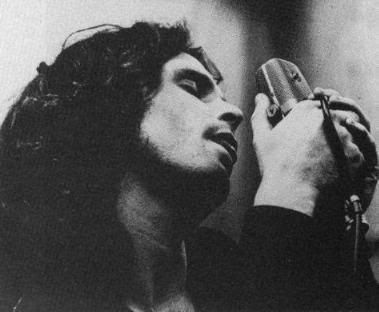 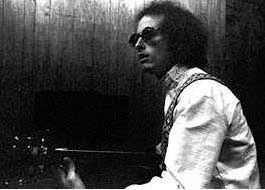 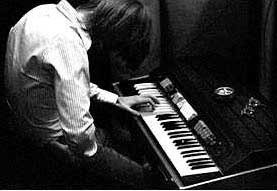 Waiting For The Sun ( 1968 ) 7½ Waiting For The Sun ( 1968 ) 7½Hello, I Love You / Love Street / Not To Touch The Earth / Summers Almost Gone / Wintertime Love / The Unknown Soldier / Spanish Caravan / My Wild Love / We Could Be So Good Together / Yes, The River Knows / Five To One A change of pace for this, the third studio album by The Doors. Gone is the dark brooding of old, gone is the rock blues jazz mix. Well, everything gone for the most part, but all of these aspects do reappear in places. They'd used up their backlog of songs of course and a couple of tracks here do sound like definite filler. Open your eyes and ears however, go through with repeated listening and 'Summers Almost Gone' almost becomes your whole universe. The difference between this and previous Doors recordings is emphasized simply by the feel of this song. Imagine a sunset, sitting alone looking out of a window as the world flows by. Summers almost gone, and where will you be? What have you done? Jim sounds in fine voice and the music is dreamily relaxed. The musical mix is enhanced by piano, especially during the middle of the song. Didn't I tell you The Doors always do great breaks in songs? Ha! This is no exception. This is still The Doors we know and love! This isn't exactly Rock n Roll and not too many people out there appear to love this song in preferance to say 'You're Lost Little Girl' but really, this is just beautiful and haunting. The opening 'pop' 'Hello I Love You' borrows its melody from The Kinks 'All Day And All Of The Night' and really isn't too great. It sounds tired, sounds under pressure to provide a commercial moment on demand. They were under strain and pressure to produce this set of songs as they largely had nothing prepared. 'Love Street' is funny! Again, like 'Summers Almost Gone' this is an evocative song musically and Jim once again sounds in fine voice. Another relaxed and mellow song full of hooks. The hooks are there! Jim wanted a 12 minute plus song called 'Celebration Of The Lizard' to be included on the record. None of the other Doors did so instead they took out a section from that song and turned it into 'Not To Touch The Earth'. Now, the old Doors sound fully returns - the pounding organ swirls, Jim sounding demonic and mystical as the track winds itself up and up further and further as it progressives. It ends up sounding dark as hell and very enjoyable! As the piece finishes Jim claims the title of 'Lizard King' and off we go into 'Summers Almost Gone'. Fabulous stuff! Not everything is fabulous of course. I'd already hinted at that earlier hadn't I? Yes! And? Well 'Wintertime Love' is lightweight for sure but again, its just so very entertaining. You can't exactly take this short silly thing seriously but it does raise a smile when you realise this is The Doors doing this! This happy, jaunty little thing! 'The Unknown Soldier' I certainly don't care for. I don't like the tone of the lyrics and the music seems uninspired and repeating previous themes. 'My Wild Love' is hard to describe or explain. Some sort of chanting appears to be going on. Really, I just don't understand what's going on! It is actually unsettling though which may have been the point but all that's really acheived is a desire in the listener to skip to the next track. The album carries on through an unusual path. 'We Could Be So Good Together' again appears to be a lightweight composition by past Doors standards but it does sport decent melodies throughout. 'Yes, The River Knows' is the closest we come to Doors as easy listening here, something previously unimaginable. Yes, whilst the likes of 'Summers Almost Gone' created an atmosphere with a marriage of lyrics and appropriate music here the lyrics don't entirely appear suited to the music at all. Nice piano though. And! After all of that we have some old style Doors music done very well with 'Five To One'. The keyboard and bass pounds, the guitar is dramatic and Jim sounds on the edge. A good way to close something that remains an inconsistant listen, certainly when compared to the first two Doors records - but does have enough moments sprinkled throughout to ensure an enjoyable listen. The very fact that some songs here are so different sounding to previous Doors material is actually a good thing. The lack of a 'Light My Fire' or a 'When The Musics Over' is of course noticeable but if taken on its own terms, then yeah, this is certainly a good album. Adrian's Album Reviews 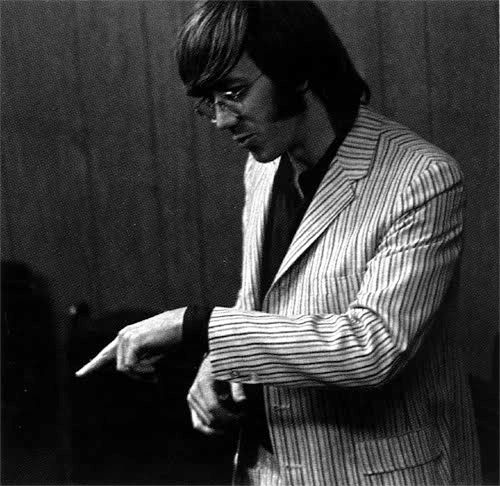 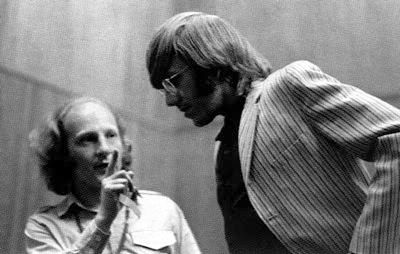 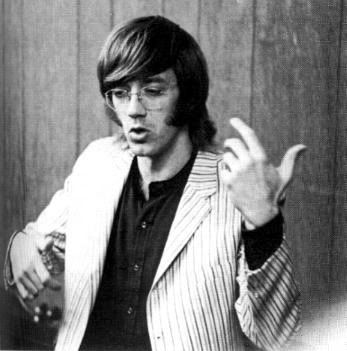 |
|
|
|
Post by TheWallsScreamedPoetry on May 5, 2006 22:41:56 GMT
The Doors:Waiting For The Sun
Year Of Release: 1968
Record rating = 7
Overall rating = 11
This one's a happy pop album! Yuck! Imagine that!
Best song: NOT TO TOUCH THE EARTH
Track listing: 1) Hello I Love You; 2) Love Street; 3) Not To Touch The Earth; 4) Summer's Almost Gone; 5) Wintertime Love; 6) The Unknown Soldier; 7) Spanish Caravan; 8) My Wild Love; 9) We Could Be So Good Together; 10) Yes The River Knows; 11) Five To One.
A terrible letdown. Well - after all, when you've come up with the best you could, you can't but drop down, can you? Seems so. The band themselves used to explain this failure by the 'third album factor': you play together for a long time, come up with all kinds of material, sift it, polish it, put all the winners on your first two records, and by the time it comes to recording your third record, you're left with nothing but the chaff or nothing at all. One must give the band their due, of course, since only an ultra-talented musical outfit can pack their two first records to the brim with prime material - most bands would probably experience the 'third album factor' at the stage of the first one. But this does not deprive us from the fact that this statement is completely true, and the 'third album factor' is really existent. At least, it was existent for the Doors.
OK, so Waiting For The Sun is a lot more crowd-pleasing than the previous one: it's softer, gentler, a lot of the dark mood is lost, and there's a lot of tender ballads which are not dark at all - just plain sad and melancholic. But wait! That's not Morrison's forte! The stupid thing is that as soon as he reminds himself that he's really Prince of the Darkness, everything's OK. That means that in order to save the album from ruin, we have such terrific tracks as 'Not To Touch The Earth' and 'Five To One'. The first one is an excerpt from the band's lengthy live epic 'Celebration Of The Lizard' which they wanted first to put on the album in its entirety, but changed their mind about at the last moment; a wise decision, probably, since the version on Absolutely Live amply demonstrates that - mildly speaking - this suite was rather far from musical perfection. 'Not To Touch The Earth', however, is the suite's brightest moment, a magnificent 'mystical march' with a terrifying speeding up at the end; and, of course, it's the song that earned Jim his eternal nickname of 'The Lizard King'. And the gruesome 'Five To One', an ode to brute force, violence (and possibly Jim's beloved Friedrich Nietzsche) is, undoubtedly, the heaviest and most frightening song the band ever did; its four and a half minutes pack more emotional impact and heavy emotions than the entire black metal movement. You know a song's great when it serves as a great source for all kinds of quotations - 'Five to one baby one and five/No one here gets out alive' is probably the Doors' best known lyrical line (apart from 'come on baby light my fire', of course, which isn't even Morrison).
But what about the rest? Some tracks are - pardon me Jim - completely dorkish, like the short (thank God) pop melody in 'Wintertime Love' and the absolutely unnecessary 'Yes The River Knows' (what it knows exactly, I still can't guess). 'Wintertime Love' is a waltz, for Chrissake! Is it a sellout or what? Of course, it's rather hard to determine what exactly could have been a 'sellout' in the Sixties (I don't know any examples), but this is the closest to a Sixties' sellout I've ever seen. And 'Yes The River Knows' is so quiet and derivative of the Strange Days balladeering that I hardly ever notice the song... I do appreciate the sudden change from its soft sound to the gruffness of 'Five To One', though.
Some of the other tracks are rather lovely (the depressing ballads 'Love Street', 'Summer's Almost Gone'), but I'd rather have them sung by any other band but The Doors. Or put them on an outtakes album, at least - there they would serve as pleasant surprises. Don't get me wrong: I like both songs very much, because they're pretty and they're memorable (what else does one need?), but the Doors have an identity, and they don't fit my conception of the Doors. Maybe it's my personal problem and I need to widen the conception? Oh, and if you want some more real complaints, here goes: the shaman chanting 'My Wild Love' is senseless (a great way to kill time and fill space), the B-side opener 'Spanish Caravan' is a stupid Spanish-style ballad (I don't care much for Robbie's flamenco-style playing, thank you), and 'We Could Be So Good Together' goes nowhere in particular, especially in the lyrical department: 'We could be so good together/Yeah, so good together/We could be so good together/Yeah we could/I know we could'. Your impression?
So the only other two tracks that save some face is the album-opening rocker 'Hello I Love You' (some people say it's ripped-off from the Kinks, but I still can't figure what they're talking about), and the antiwar anthem 'The Unknown Soldier' with the band's impersation of a firing squad in midsong. The screams 'it's all over, war is over' at the end sound great, especially since it's not genuine - it's a mockery!
Very, very weak for the Doors' own standards. This is still a very good record by anybody else's standards, of course; but it does heavily sound like many of these songs were written and recorded in great haste, not to mention under heavy circumstances - Jim's personal drug and alcohol problems were getting worse and worse all the time, so Krieger was slowly taking over the leader functions, and this really hurt the boys' image. Particularly in retrospect - where will you find another reviewer on the Web that would have as many nice things to say about The Soft Parade as I do?
George Starostin from Only Solitaire.com
|
|
|
|
Post by TheWallsScreamedPoetry on May 7, 2006 10:45:46 GMT
Waiting For The Sun
Listening to this album you can't help but feel the Doors are at a bit of a loose end. Most of this sounds much like the material on Strange Days, whilst the tracks that do aim at diversity don't actually sound much like Doors' songs. Obviously none of this entails that this is a bad album but it definitely suggests the Doors were running out of ideas and looking for some new ones. Still, if you are going to carry on in the vein of Strange Days you are still coming to come up with the goods and this album certainly does, just not to such stunning effect as on the previous album. "Hello, I Love You" (good title, by the way) could easily have slotted into the running order on Strange Days. It if did, though, I would no doubt have listed it as a best track as it is another of the Doors' greatest hits. One of two, really, on this album - the other being the album closer "Five to One". "Hello, I Love You", though, is unquestionably a great pop song. "Five to One", on the other hand, aims more at what the band will go on to achieve on their last two albums, namely a great pounding rock song. For a band that refused to have a bassist it seems rather cheeky to rely so much on a bass riff but all that is swiftly forgiven when the song kicks in. Morrison's at his most Iggy-ish with loose, almost deranged, vocals (I think about war, but who's counting?) set against a pulsating, dramatic riff. The only real surprise is that, as the last song on the album, it is less than ten minutes long (a mere four). Anyway, first track = a great pop song and last track = a great rock song, what of the rest? Well, you might consider them a somewhat patchy, and at times bizarre, collection. "Love Street", "Summer's Almost Gone" and "Yes, the River Knows" are all piano-driven which, at least, avoids the "casio" effect. All three are amongst the best of the rest on the album. At a push "Summer's Almost Gone" is the best with a nice melody and, lyrically, a clever metaphor about the loss of childhood. "Love Street", on the other hand, is a fairly perky love song, not without a certain goofish charm. The piano line on the verse of "Yes, the River Knows" is a rather odd one. I presume it is jazz-influenced as it is all over the place (although presumably never out of key) which rather unfortunately obscures the actual melody of the song. I'm not sure if the vocal melody for the verse is that great regardless. The real power and appeal of the song lies in the chorus with a nice vocal melody and an entrancing, descending piano line. What about the odd diversity then? Well I'd say two songs are particularly odd, "Spanish Caravan" and "My Wild Love". "Spanish Caravan" is even included on the Greatest Hits but it seems a rather unusual choice both on account of its odd structure and the fact that it isn't all that great. It begins with some accomplished flamenco picking from Kreiger with Morrison singing silly lyrics soon after. Half way through, though, it changes to an electric riff and tries to turn itself into an electric latin-style rocker without really succeeding. It doesn't really sound much like a Doors' song at all, more like their LA neighbours' Love but it certainly ain't up to the quality of Forever Changes. "My Wild Love", on the other hand, is sung basically a cappella by Morrison with the band singing funny rhythmic noises. There are definitely no instruments involved although it certainly ain't barber-shop. The anti-war tale "The Unknown Soldier" is also a bit funny, with military sound effects taking the place of the song for a section in the middle. It is better than the previous two oddities but it isn't really long enough to make its point and I doubt the song-writing is good enough for an epic length anyway. Damned if you do, damned if you don't, it would seem. A final word of commendation for "We Could Be so Good Together" which is a lot like the Strange Days material again. In some kind of summary: this is a strong and competent album with plenty of fine compositions. You can't help but feel the band aren't really going anywhere and the attempts to break free are a little weak. Still, I'm sure they'll get it right. If not on the next album definitely the one after. On that I'm certain. 8/10
Jack Feeny Review Pages.
|
|
|
|
Post by TheWallsScreamedPoetry on May 10, 2006 18:06:02 GMT
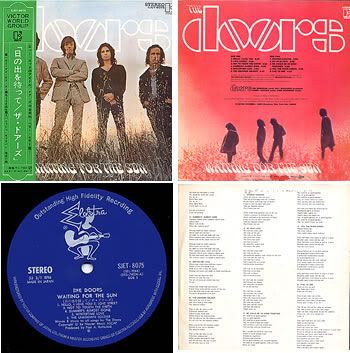 Ultra Rare Japanese edition....note the Elektra label is the one Jac Holzman originally used when he first introduced the label back in the 50s when he took an 'M' and laid it on it's side. 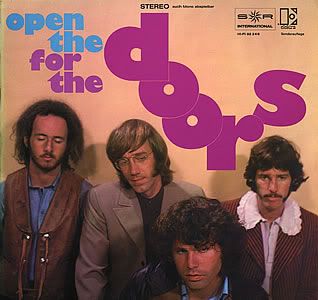 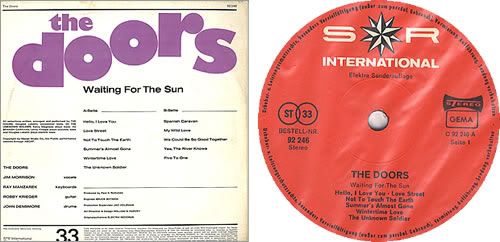 THE DOORS Open The Doors For The Doors Very rare original 1968 German Elektra 'sonderauflage' 11-track stereo vinyl LP - record club edition of the 'Waiting For The Sun' album, issued in association with SR International, housed in a unique colour front laminated picture sleeve. |
|
|
|
Post by TheWallsScreamedPoetry on May 18, 2006 11:22:12 GMT
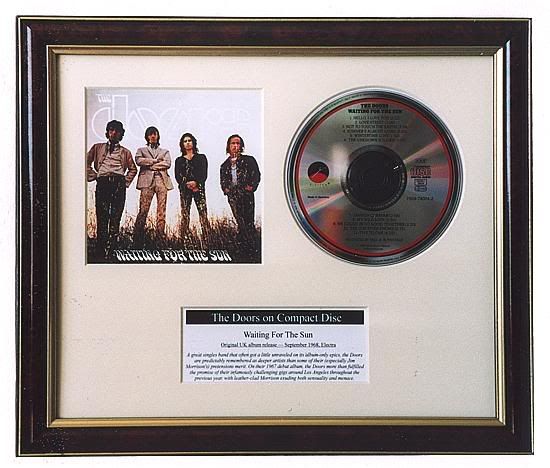 Framed Collectors CD. |
|
|
|
Post by TheWallsScreamedPoetry on May 19, 2006 11:59:19 GMT
THE DOORS Waiting For The Sun (Deleted US DCC remastered 11-track 24kt GOLD audiophile CD, picture sleeve in die-cut picture slipcase. 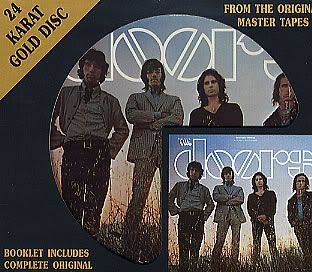 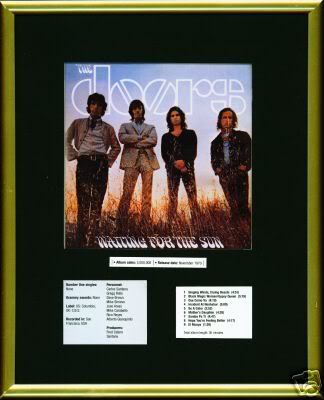 |
|
|
|
Post by TheWallsScreamedPoetry on Jul 12, 2006 10:51:15 GMT
Released this day July 12th 1968 Waiting For The Sun is greeted with a mixture of reactions from fan and critic alike.........its a US hit and the album that brings the band to the attention of a European audience but the cracks are obvious in the 3rd Doors album as several tracks seem mere fillers thrown in out of a rush to finally finish this difficult album........ later we will discover the reasons behind the fragmented feel of the album but overall it has stood up well over the last near 40 years and is still a favourite with Doors fans. Originally titled 'Celebration Of The Lizard' (the cover was planned to be a snakeskin cover with The Doors in gold embossed lettering) and later when COTL failed 'American Nights' which would have featured the poetry between tracks the band opted for WFTS which came from the unfinished track of the same name which was recorded during these sessions but would not appear until the bands 5th album. Most notable was the absence of COTL which confusingly was still left on the inner sleeve. The band was faced with a bit of a dilemma when it came to releasing a single as both Love Me Two Times & the more recent Unknown Soldier had fallen foul of US morality radio and had received little airplay and as such not sold well.........they opted for the easy on the ear poppy number 'Hello I Love You' which was championed by 10 year old Adam Holzman as a track they should re-record when it became apparent they were struggling once they lost 2 thirds of the album content with the COTL failure. Adam had remembered it from the demo and his dad Jac (their boss) persuaded the band to record it as a four piece when the seemed reluctant to consider what they thought was an old number..... It became their second biggest hit....  |
|
|
|
Post by TheWallsScreamedPoetry on Oct 9, 2007 8:10:53 GMT
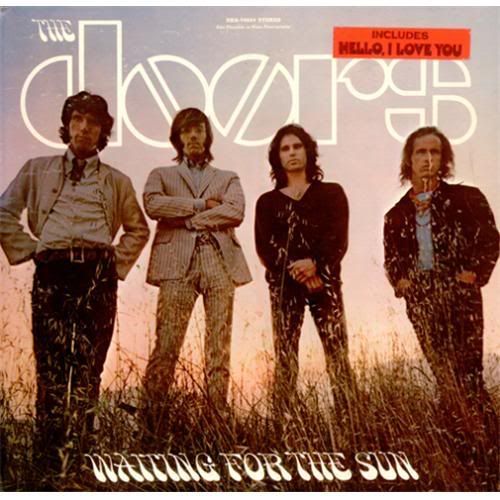 Waiting for the Sun -- The Doors, September 7, 1968 Posted by Craig Rosen at 9/9/2008 5:03 PM and is filed under The Doors,1968,Classic Rock,Rock,'60s Elektra 74024 Producer: Paul A. Rothchild Track listing: Hello, I Love You / Love Street / Not to Touch the Earth / Summer's Almost Gone / Wintertime Love / The Unknown Soldier / Spanish Caravan / My Wild Love / We Could So Good Together / Yes, the River Knows / Five to One September 7, 1968 4 weeks (nonconsecutive) When the Doors entered the studio in early 1968, the band "hit the third wall," said producer Paul A. Rothchild. The Los Angeles band's 1967 self-titled debut album, which featured the Number One hit "Light My Fire," was recorded in a mere days. Strange Days, the followup album released later that year, took cut two months. Then came Waiting the Sun, which could have been called Waiting for Jim, as Doors frontman Jim Morrison "frequently didn't show up or showed up late, drunk or uninspired," Rothchild said. In a short 12 months, Morrison had become a rock star and sex symbol he was beginning to feel trapped by his image. "He was getting tired of the rock star trip," said Rothchild. “With that much fame, he figured, ‘I am the Lizard King, I can do anything,’" as Morrison himself stated at the end of "Not to Touch the Earrth." Morrison frequently showed up stoned with various hangers-on in tow. Drummer John Densmore got disgusted that at one point he quit the band, only to return to the studio next day. As manager Bill Siddons noted, "Jim's unpredictable behavior was wearing everyone out." Morrison's inner struggle, coupled with the band's shortage of new material and Rothchild's perfectionist tendencies, made the sessions difficult. "It didn't have the ease that the other records had," said Rothchild. "Most of it was invented in the studio. They were digging for tunes." "Five to One" came together from a studio jam, with Morrison chanting his lyrics over Densmore's 4/4 beat, while Robbie Krieger and Ray Manzarek improvised guitar and keyboard parts, respectively. Yet other songs were extremely tedious to record. Part of "The Unknown Soldier" took up to 60 takes to complete. The track, which Rothchild said was "pieced together in sections like a film," was Morrison's first overtly political song. "Hello, I Love You" showed the other side of the Doors. The song was discovered by Rothchild after he asked the band if they had any songs that they thought "were not worthy of their dignity." When Densmore brought up the title, Morrison cringed. "Jim said, 'It's just a dumb little song I wrote out in Venice one day when I saw this black chick walk by,"' Rothchild recalled. "He sang the song and when they hit the chorus the first time, I shit in my pants. I said, –'That's a Number One record."' With a little studio wizardry and experimenting, including a middle section in which Rothchild stacked 10 different recordings of Krieger's guitar recorded at different speeds, the song was completed. Rothchild's hunch also turned out to be correct, as "Hello, I Love You" became the Doors' second Number One single on August 3, 1968. Just over a month later, Waiting for the Sun would become the Doors' first and only Number One album. Said Rothchild of the difficult sessions, "We knew where the end of the maze was. Sometimes we would rattle around inside, but we knew we would come out the other end." Yet three years later, Morrison's self-destructive behavior took its final toll. On July 2, 1971, he was found dead in a bathtub in Paris. Medical officials said Morrison, 27, died of a heart attack. He may have suspected his fate as early as Waiting for the Sun, as he sung in "Five to One": "No one here gets out alive." THE TOP FIVE Week of September 7, 1968 1. Waiting for the Sun, The Doors 1. Time Peace/ Greatest Hits, The Rascals 2. Wheels of Fire, Cream 3. Feliciano!, Jose Feliciano 4. Realization, Johnny Rivers 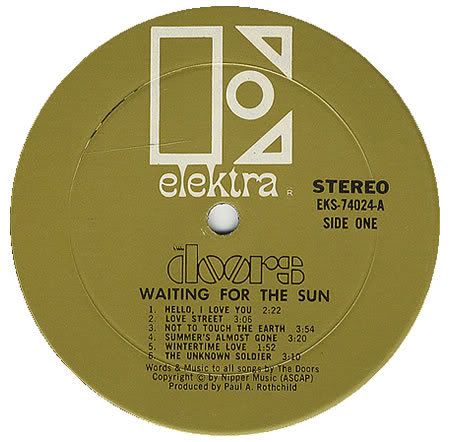 THE DOORS Waiting For The Sun Rare US 1st issue gold Elektra label 11-track STEREO vinyl LP, in gatefold 'pocket style' picture sleeve with lyrics inside and 'Hello, I Love You' sticker on the front! picture sleeve with lyrics inside. |
|
|
|
Post by TheWallsScreamedPoetry on Jul 24, 2008 12:15:34 GMT
The Doors: Album Guide - Waiting For The Sun (1968)
Expectation levels were sky high for the third Doors album. Typically, they chose just this moment to confound everyone by coming up with a very different collection of material. Out went attention-grabbing anthems like ‘Light My Fire’ and ‘People Are Strange’ and in came a wilfully esoteric blend of the mellow, the melodic and the unsettlingly out-there as the band explored the limits of their creativity. This included winning combinations of balladic rock (‘Love Street’, ‘Wintertime Love’) elegiac mood pieces (‘Summer’s Almost Gone’, ‘Yes, The River Knows’) one pop masterpiece – and their second US No. 1 single – ‘Hello, I Love You’, and, just to keep the pot boiling over, a profoundly moving, deliberately inflammatory anti-Vietnam war song in ‘The Unknown Soldier’. There was also a portion of a piece begun as another of Morrison’s poems, ‘Celebration Of The Lizard’, which the band had originally intended would take up the whole of side two but could never “get right” in the studio, and only ended up using a fraction of, re-titled ‘Not To Touch The Earth’. Elsewhere there was also the flamenco guitar of ‘Spanish Caravan’ to enjoy, and the menacing-sounding album climax, ‘Five To One’ to ponder (its meaning kept even from the band by a for once coy Morrison). Perplexed by its many different shades of black, critics were not kind to the album but it still went to No. 1. (Bizarre footnote: the track, ‘Waiting For The Sun’, was not released until the Morrison Hotel album two years later.)
Tracklist: Hello, I Love You / Love Street / Not To Touch The Earth / Summer's Almost Gone / Wintertime Love / The Unknown Soldier / Spanish Caravan / My Wild Love / We Could Be So Good Together / Yes, The River Knows / Five To One
Mick Wall 2008
|
|
|
|
Post by TheWallsScreamedPoetry on Jan 15, 2011 17:39:36 GMT
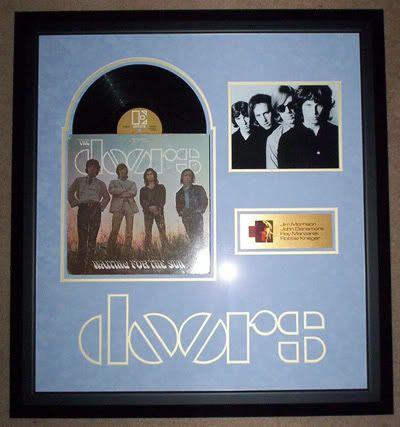 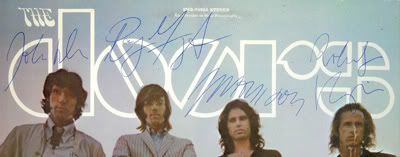 WFTS Album autographed by all 4 Doors members. |
|
|
|
Post by TheWallsScreamedPoetry on Jan 24, 2011 19:47:24 GMT
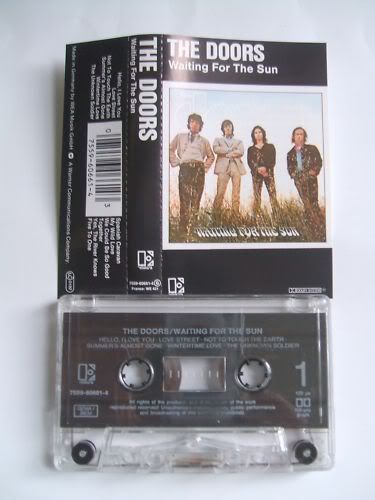 Tape version |
|
|
|
Post by TheWallsScreamedPoetry on Jan 30, 2011 11:13:10 GMT
The Doors Were Recording Their Third Album, and Joan Didion Was Sitting on the Floor of the Studio
…the studio was too cold and the lights were too bright and there were masses of wires and banks of the ominous blinking circuitry with which musicians live so easily.
There were three of the four Doors.
There was a bass player borrowed from a band called Clear Light.
There were the producer and the engineer and the road manager and a couple of girls and a Siberian husky named Nikki with one gray eye and one gold.
There were paper bags half-filled with hard-boiled eggs and chicken livers and cheeseburgers and empty bottles of apple juice and California rosé.
There was everything and everybody The Doors needed to cut the rest of this third album except one thing, the fourth Door, the lead singer, Jim Morrison, a 24-year-old graduate of U.C.L.A. who wore black vinyl pants and no underwear and tended to suggest some range of the possible just beyond a suicide pact.
It was a long while later.
Morrison arrived. He had on his black vinyl pants and he sat down on a leather couch in front of the four big blank speakers and he closed his eyes.
The curious aspect of Morrison’s arrival was this: no one acknowledged it.
Robby Krieger continued working out a guitar passage.
John Densmore tuned his drums.
Manzarek sat at the control console and twirled a corkscrew and let a girl rub his shoulders.
The girl did not look at Morrison, although he was in her direct line of sight.
An hour or so had passed, and still no one had spoken to Morrison.
Finally Morrison whispers something, and there’s a conversation between Morrison and Manzarek about where they should rehearse the next day—one of them thinks they should rehearse at a Holiday Inn, the other thinks they should come back to the studio—and there’s some back-and-forth dialogue.
I counted the control knobs on the electronic console.
There were seventy-six.
I was unsure in whose favor the dialogue had been resolved, or if it had been resolved at all.
Robby Krieger picked at his guitar, and said that he needed a fuzz box.
The producer suggested that he borrow one from the Buffalo Springfield, who were recording in the next studio.
Krieger shrugged.
Morrison sat down again on the leather couch and leaned back. He lit a match.
He studied the flame awhile and then very slowly, very deliberately, lowered it to the fly of his black vinyl pants. Manzarek watched him.
The girl who was rubbing Manzarek’s shoulders did not look at anyone.
There was a sense that no one was going to leave the room, ever.
It would be some weeks before The Doors finished recording this album.
I did not see it through.
Joan Didion 1968.
|
|
|
|
Post by TheWallsScreamedPoetry on Feb 19, 2011 12:49:46 GMT
Wanton World Without Lament: A Retrospective on the Doors and the Counter Counterculture
In 1968, The Doors released their third album, Waiting for the Sun. Many, especially those who were parents during the sixties or contemporary teens who have been spoon-fed their conception of the world by mass media, have an image of 1960s musicians and fans madly running around like hippies, for whom every action stereotypically entailed drugs, free love, peace, and long, colorful, often unisex clothing. These hippies, despite their varied political agendas, are often homogenized as politically charged with fun music and an overly peaceful—albeit dulled by drugs –message. However, closer examination of the lyrics of some artists, such as the Doors, indicates precisely opposite. Believing that the sixties solely revolved around the proclivity of drugs to induce forgetfulness and numbness to the world constitutes a failure to realize the multiplicity of meanings psychedelic music holds within its specific political and social context. While the band members steeped themselves in drugs in the selfsame efforts to expand their consciousness as their hippie peers, they reflected an alternate political consciousness to counterculture, rendering them a counter to counterculture. The Doors’ lyrics in their album Waiting for the Sun reflect an acute and exacting sensitivity to the multiplicity of political and social changes during the 1960s, but within a branch of counterculture entirely separate from stereotypical hippie psychedelic rock.
The Doors were different from most bands in the sixties. Their music, other than the top hit singles “Hello, I Love You” and “Light My Fire,” was not mood-lifting and it was far from peaceful. “How do we bring the drama, how do we bring the depth of emotion, how do we bring the pathos, the joy, the sorrow, the terror into rock and roll music?” Ray Manzarek, the Doors’ blues-trained organist, waxes poetic in his account of his life with the Doors. The Doors realized that the times were changing and the “good old days” were over. In the slow, lamenting tune “Summer’s Almost Gone,” the lyrics state that “Morning found us calmly unaware…when summer’s gone, where will we be?” an expression that at once reflects doubt, dismay, and nostalgia for the warm, golden days of times fast disappearing. Manzarek describes the song as “sad and melancholic. A song of the end of innocence. Perhaps of the end of love. Perhaps of the end itself.” Following “Summer’s Almost Gone” on the record is the seasonally appropriate, “Wintertime Love.” The lyrics of this nearly carnivalesque waltz are were probably intended to illustrate displeasure and are easily interpreted as such, as Morrison himself was a literary scholar, and knew literary archetypes like the back of his hand. Winter typically exemplifies disillusionment, death, cold, and sadness in literature. Therefore, it is not surprising that the lyrics lament, “Wintertime winds blow cold this season…Love has been lost, is that the reason / Trying desperately to be free.” According to Morrison’s lyrics, people were unhappy because they were caged and without love. “Your ballroom days are over, baby” Morrison half-growls, half-croons in the last track on the record, “Five to One.” The ballroom days were indeed over. All over the political and social scene everything was changing, and not necessarily for the better.
The Vietnam War changed the way everyone thought about life, and while many artists toyed with the war and its problems in their music, few to none confronted the war so blatantly in their music. “The Unknown Soldier” opens with a false calm and pleasantry, going on to tackle the war, the insensitivity of the majority of Americans to it, and the hypocrisy of our country itself. As Michael Hicks, author of Sixties Rock, notes, The Doors “[added] a delay effect to the organ, then [superimposed] the sound of steeple chimes, followed by crowd noises.” The song also featured military chants, drumrolls, and gunfire. In fact, The Doors brought in rock writers such as Paul Williams (Crawdaddy) and Richard Goldstein (Village Voice) with blank rifles to discharge at Morrison, firing-squad style, to record the background sounds in “The Unknown Soldier.” To illustrate America’s hypocrisy, the lyrics juxtapose highly contrasting images: one of the news being read at the breakfast table, and a common household commodity at the time, a television; one of a soldier being shot in the head. Emphasizing that the bullet is not striking a head that belongs to a person, but rather the “helmet’s head” illustrates the insensitivity of America, as the “helmet’s head” is objectified and depersonalized. Americans have a “hollow shoulder” – that is, no heart.
The last track on the record, “Five to One,” was actually cut down from The Doors’ 17 minute theatrical piece “The Celebration of the Lizard,” but abbreviating the piece did not reduce the song’s antigovernment message. According to Manzarek, the line “They got the guns, but we got the numbers” was something Jim Morrison actually said once in everyday conversation. “‘They can ship us off to Vietnam to be slaughtered in an Asian jungle, but they can’t kill us all. We’ve got the numbers,’” he said. Clearly, The Doors did not feel supportive of the government, and felt equally dismal toward the fate of the troops. Providing the title of the song are the sham statistics “Five to one, baby, one in five / No one here gets out alive now.” The actual song recording is a wonder in and of itself, as an already drunk Morrison choked down some unidentified pills with bourbon before insisting that they record “Five to One” immediately. As Manzarek says, “His rhythm was a little off in the “get together one more time” section…but it was such an impassioned performance that we put it on the record.” This leads us to wonder, is it possible that Morrison’s alcoholism amplified rather than dulled his artistic ability?
Hand in hand with the war were politics, something The Doors were not unaware of. “Not To Touch the Earth” clearly recognizes JFK’s assassination with the lines “Dead president’s corpse in the driver’s car / The engine runs on glue and tar” and goes on to prove cognizance of the tensions with Russia and communism that still existed despite the lack of “real” war between Russia and the U.S. by “not goin’ very far / To the East to meet the Czar.” By choosing to explore the East, The Doors figuratively leave the West by choice, probably because they believe that America’s seeming luxury is a façade: “The mansion is warm at the top of the hill / Rich are the rooms and the comforts there / Red are the arms of luxuriant chairs / And you won’t know a thing till you get inside.”
While music in the sixties regularly confronted the idea of peace and the need for peace, the Doors differ from their contemporaries in that their lyrics do not expound upon the need for world peace but rather the inability to achieve it. In “We Could Be So Good Together,” The Doors critique the world peace movement by simply calling it a lie: “Tell you wicked lies / Tell you ‘bout the world that we’ll invent / Wanton world without lament.” The lie is that peace is a real possibility. The Doors saw the world around them and heard the message of their peers, and concluded that the two models of society, one real and one hoped-for, were as incompatible as oil and water. Unlike what most musical artists professed but probably like what most Americans believed, the Doors had given up on peace, because, as Manzarek explains, at the end of the sixties and the beginning of the seventies a wave of paranoia had swept over the youth of America. Death and the rumor of death had descended upon us, entered our conscious mind, and filtered down into our subconscious, where they lodged like a bad cancer.”
The paranoia and distress of everyday life inevitably led to the search for escape. For many people in the sixties, drugs and alcohol provided precisely that. Drugs often became a social activity with a great deal of pressure involved. The song “Five to One” recognizes that pressure with the line “You see, I gotta go out in this car with these people / And get fucked up.” However, many turned to drugs and alcohol, not purely to “expand their consciousness” but also to simply get away. Naturally, people wanted to escape the violent, vicious world to which they were held victim. The song “Yes, the River Knows” reflects a stolid determination to “drown in mysticated wine,” to “breathe underwater till the end.” In the Latin-influenced ballad “Spanish Caravan,” Morrison begs the caravan to “Take me away.” But perhaps the song most reflective of drug use, although indirectly, is “My Wild Love.” The song describes a woman who asks the Devil to pay for her “riding” or traveling – or escaping. When he refuses, she continues riding, presumably chased by the Devil. She is not being chased by the devils of the past so much as the devils of the present; she is concerned the present will catch up with her if she stops riding. That is, she is concerned that the reality of the world will hit her if she stops numbing herself with drugs, for all she wants is “for the people / to let her go free.”
One has to understand that the songs are symbolic and cannot be taken literally. Morrison was an accomplished reader and poet who, as Manzarek explains, “was borrowing and quoting and paying homage to his masters.” The Doors’ particular branch of counterculture was not of their own invention. Their ideologies – particularly Jim Morrison’s – drew upon 1950s Beatnik counterculture, with darlings such as Jack Kerouac and Allan Ginsberg, famous writers and poets known for their disillusionment, criticism, and individuality. At the end of the lyrics to the theatrical piece “Celebration of the Lizard,” which was never completed to the satisfaction of the band members and was therefore not included on the LP (but was still considered important enough to be featured on the inside cover), Morrison writes, “I am the Lizard King.” While Morrison was eccentric at times, it can be assumed that Jim Morrison did not really believe he was king of the lizards.
Many argue that Jim Morrison was so dependent on alcohol that he, and consequently his lyrics, was numb to the goings-on of the world, both politically and socially. As Manzarek himself acknowledges, “the drinking didn’t exactly help the situation.” However, Morrison had a vested interest in a great deal of his songs’ subjects. One day, when asked why he was feeling low, he admitted that his father had been promoted to the rank of admiral, recognizing his father’s vocation as a “professional killer.” Rock writer Mikal Gilmore expands this idea: “Morrison’s lyrics were a recognition that an older generation had betrayed its children and that this betrayal called for a bitter payback.” The young people were angry that their parents’ generation harbored no qualms about shipping them off to kill people they had never met, while their parents could not imagine why they so profoundly lacked patriotism. Furthermore, the older generation was threatened by blatantly confrontational lyrics such as “The old get older and the young get stronger…/ Gonna win, yeah, we’re takin’ over!” in the still disillusioned but most hopeful sounding song on the album, “Five to One.” The older generation generally took issue with the message the lyrics embodied, which highlighted the generation gap.
While this is less true in the modern day, many believed that the lyrics are offensive and argue that, as the works of drug addicts, the lyrics cannot be taken seriously. However, it is because the lyrics are offensive and written by drug addicts that they ought to be taken seriously, because a propensity to offend and do drugs is what defined the sixties. Some would claim that the sixties were about other things as well, such as peace and Civil Rights, but is it not true that the idea of quitting Vietnam, or of black people being equals to whites offended a lamentably large percent of the population? The ability of a range of issues to spark controversy is a key factor in the modern conception of the sixties. The lyrics are therefore emblematic of the sixties and its politics and society as perceived by a certain people, in this case The Doors and their followers, at the time. According to one letter written to the FBI that encouraged the curtailing of sales of material like Waiting For the Sun and anything similar, the “the great majority of Americans will applaud any efforts to make record racks and newsstands refrain from peddling such filth.”
Waiting for the Sun is considered by many to be a weak album compared with the Doors’ more mature, and conversely, more raw albums because of its oftentimes cryptic lyrics, softer sound, and seemingly softer message. However, it carries deep political and social critiques, spanning over almost the entire scope of human experience in the sixties. It engages the Vietnam War, current events, politics, international relations, peace, drugs, alcohol, love, sex, religion and the loss of religion, and overall, the changing of the times. The Doors’ decisively different analysis of their time through their lyrics is often underestimated, especially in Waiting for the Sun.
By Emily Hazzard
From Gadfly Online– 7 February, 2011
|
|
|
|
Post by casandra on Feb 19, 2011 15:37:40 GMT
Very interesting article, it is a 180 degree turn the “pop” point view about WFTS. It's funny to read some critics’ reviews on Spanish Caravan.   Flamenco gypsy singers and guitarists (cante jondo) are still darker than Morrison. They performed on a dark stage, dressed in black, lit only by the spotlights and they don’t usually move, sitting in their chairs.... Most of the songs are about death! |
|
|
|
Post by TheWallsScreamedPoetry on Mar 19, 2011 16:36:13 GMT
A change of pace for this, the third studio album by The Doors. Gone is the dark brooding of old, gone is the rock blues jazz mix. Well, everything gone for the most part, but all of these aspects do reappear in places. They'd used up their backlog of songs of course and a couple of tracks here do sound like definite filler. Open your eyes and ears however, go through with repeated listening and 'Summers Almost Gone' almost becomes your whole universe. The difference between this and previous Doors recordings is emphasized simply by the feel of this song. Imagine a sunset, sitting alone looking out of a window as the world flows by. Summers almost gone, and where will you be? What have you done? Jim sounds in fine voice and the music is dreamily relaxed. The musical mix is enhanced by piano, especially during the middle of the song. Didn't I tell you The Doors always do great breaks in songs? Ha! This is no exception. This is still The Doors we know and love! This isn't exactly Rock n Roll and not too many people out there appear to love this song in preferance to say 'You're Lost Little Girl' but really, this is just beautiful and haunting. The opening 'pop' 'Hello I Love You' borrows its melody from The Kinks 'All Day And All Of The Night' and really isn't too great. It sounds tired, sounds under pressure to provide a commercial moment on demand. They were under strain and pressure to produce this set of songs as they largely had nothing prepared. 'Love Street' is funny! Again, like 'Summers Almost Gone' this is an evocative song musically and Jim once again sounds in fine voice. Another relaxed and mellow song full of hooks. The hooks are there!
Jim wanted a 12 minute plus song called 'Celebration Of The Lizard' to be included on the record. None of the other Doors did so instead they took out a section from that song and turned it into 'Not To Touch The Earth'. Now, the old Doors sound fully returns - the pounding organ swirls, Jim sounding demonic and mystical as the track winds itself up and up further and further as it progressives. It ends up sounding dark as hell and very enjoyable! As the piece finishes Jim claims the title of 'Lizard King' and off we go into 'Summers Almost Gone'. Fabulous stuff! Not everything is fabulous of course. I'd already hinted at that earlier hadn't I? Yes! And? Well 'Wintertime Love' is lightweight for sure but again, its just so very entertaining. You can't exactly take this short silly thing seriously but it does raise a smile when you realise this is The Doors doing this! This happy, jaunty little thing! 'The Unknown Soldier' I certainly don't care for. I don't like the tone of the lyrics and the music seems uninspired and repeating previous themes. 'My Wild Love' is hard to describe or explain. Some sort of chanting appears to be going on. Really, I just don't understand what's going on! It is actually unsettling though which may have been the point but all that's really acheived is a desire in the listener to skip to the next track.
The album carries on through an unusual path. 'We Could Be So Good Together' again appears to be a lightweight composition by past Doors standards but it does sport decent melodies throughout. 'Yes, The River Knows' is the closest we come to Doors as easy listening here, something previously unimaginable. Yes, whilst the likes of 'Summers Almost Gone' created an atmosphere with a marriage of lyrics and appropriate music here the lyrics don't entirely appear suited to the music at all. Nice piano though. And! After all of that we have some old style Doors music done very well with 'Five To One'. The keyboard and bass pounds, the guitar is dramatic and Jim sounds on the edge. A good way to close something that remains an inconsistant listen, certainly when compared to the first two Doors records - but does have enough moments sprinkled throughout to ensure an enjoyable listen. The very fact that some songs here are so different sounding to previous Doors material is actually a good thing. The lack of a 'Light My Fire' or a 'When The Musics Over' is of course noticeable but if taken on its own terms, then yeah, this is certainly a good album.
Waiting For The Sun 7½/10 ( 1968 )
Hello, I Love You / Love Street / Not To Touch The Earth / Summers Almost Gone / Wintertime Love / The Unknown Soldier / Spanish Caravan / My Wild Love / We Could Be So Good Together / Yes, The River Knows / Five To One
Adrian Denning
|
|
|
|
Post by darkstar3 on Jun 3, 2011 14:44:23 GMT
Gadfly
Wanton World Without Lament: A Retrospective on the Doors and the Counter Counterculture
BY EMILY HAZZARD – 7 FEBRUARY, 2011
In 1968, The Doors released their third album, Waiting for the Sun. Many, especially those who were parents during the sixties or contemporary teens who have been spoon-fed their conception of the world by mass media, have an image of 1960s musicians and fans madly running around like hippies, for whom every action stereotypically entailed drugs, free love, peace, and long, colorful, often unisex clothing. These hippies, despite their varied political agendas, are often homogenized as politically charged with fun music and an overly peaceful—albeit dulled by drugs –message. However, closer examination of the lyrics of some artists, such as the Doors, indicates precisely opposite. Believing that the sixties solely revolved around the proclivity of drugs to induce forgetfulness and numbness to the world constitutes a failure to realize the multiplicity of meanings psychedelic music holds within its specific political and social context. While the band members steeped themselves in drugs in the selfsame efforts to expand their consciousness as their hippie peers, they reflected an alternate political consciousness to counterculture, rendering them a counter to counterculture. The Doors’ lyrics in their album Waiting for the Sun reflect an acute and exacting sensitivity to the multiplicity of political and social changes during the 1960s, but within a branch of counterculture entirely separate from stereotypical hippie psychedelic rock.
The Doors were different from most bands in the sixties. Their music, other than the top hit singles “Hello, I Love You” and “Light My Fire,” was not mood-lifting and it was far from peaceful. “How do we bring the drama, how do we bring the depth of emotion, how do we bring the pathos, the joy, the sorrow, the terror into rock and roll music?” Ray Manzarek, the Doors’ blues-trained organist, waxes poetic in his account of his life with the Doors. The Doors realized that the times were changing and the “good old days” were over. In the slow, lamenting tune “Summer’s Almost Gone,” the lyrics state that “Morning found us calmly unaware…when summer’s gone, where will we be?” an expression that at once reflects doubt, dismay, and nostalgia for the warm, golden days of times fast disappearing. Manzarek describes the song as “sad and melancholic. A song of the end of innocence. Perhaps of the end of love. Perhaps of the end itself.” Following “Summer’s Almost Gone” on the record is the seasonally appropriate, “Wintertime Love.” The lyrics of this nearly carnivalesque waltz are were probably intended to illustrate displeasure and are easily interpreted as such, as Morrison himself was a literary scholar, and knew literary archetypes like the back of his hand. Winter typically exemplifies disillusionment, death, cold, and sadness in literature. Therefore, it is not surprising that the lyrics lament, “Wintertime winds blow cold this season…Love has been lost, is that the reason / Trying desperately to be free.” According to Morrison’s lyrics, people were unhappy because they were caged and without love. “Your ballroom days are over, baby” Morrison half-growls, half-croons in the last track on the record, “Five to One.” The ballroom days were indeed over. All over the political and social scene everything was changing, and not necessarily for the better.
The Vietnam War changed the way everyone thought about life, and while many artists toyed with the war and its problems in their music, few to none confronted the war so blatantly in their music. “The Unknown Soldier” opens with a false calm and pleasantry, going on to tackle the war, the insensitivity of the majority of Americans to it, and the hypocrisy of our country itself. As Michael Hicks, author of Sixties Rock, notes, The Doors “[added] a delay effect to the organ, then [superimposed] the sound of steeple chimes, followed by crowd noises.” The song also featured military chants, drumrolls, and gunfire. In fact, The Doors brought in rock writers such as Paul Williams (Crawdaddy) and Richard Goldstein (Village Voice) with blank rifles to discharge at Morrison, firing-squad style, to record the background sounds in “The Unknown Soldier.” To illustrate America’s hypocrisy, the lyrics juxtapose highly contrasting images: one of the news being read at the breakfast table, and a common household commodity at the time, a television; one of a soldier being shot in the head. Emphasizing that the bullet is not striking a head that belongs to a person, but rather the “helmet’s head” illustrates the insensitivity of America, as the “helmet’s head” is objectified and depersonalized. Americans have a “hollow shoulder” – that is, no heart.
The last track on the record, “Five to One,” was actually cut down from The Doors’ 17 minute theatrical piece “The Celebration of the Lizard,” but abbreviating the piece did not reduce the song’s antigovernment message. According to Manzarek, the line “They got the guns, but we got the numbers” was something Jim Morrison actually said once in everyday conversation. “‘They can ship us off to Vietnam to be slaughtered in an Asian jungle, but they can’t kill us all. We’ve got the numbers,’” he said. Clearly, The Doors did not feel supportive of the government, and felt equally dismal toward the fate of the troops. Providing the title of the song are the sham statistics “Five to one, baby, one in five / No one here gets out alive now.” The actual song recording is a wonder in and of itself, as an already drunk Morrison choked down some unidentified pills with bourbon before insisting that they record “Five to One” immediately. As Manzarek says, “His rhythm was a little off in the “get together one more time” section…but it was such an impassioned performance that we put it on the record.” This leads us to wonder, is it possible that Morrison’s alcoholism amplified rather than dulled his artistic ability?
Hand in hand with the war were politics, something The Doors were not unaware of. “Not To Touch the Earth” clearly recognizes JFK’s assassination with the lines “Dead president’s corpse in the driver’s car / The engine runs on glue and tar” and goes on to prove cognizance of the tensions with Russia and communism that still existed despite the lack of “real” war between Russia and the U.S. by “not goin’ very far / To the East to meet the Czar.” By choosing to explore the East, The Doors figuratively leave the West by choice, probably because they believe that America’s seeming luxury is a façade: “The mansion is warm at the top of the hill / Rich are the rooms and the comforts there / Red are the arms of luxuriant chairs / And you won’t know a thing till you get inside.”
While music in the sixties regularly confronted the idea of peace and the need for peace, the Doors differ from their contemporaries in that their lyrics do not expound upon the need for world peace but rather the inability to achieve it. In “We Could Be So Good Together,” The Doors critique the world peace movement by simply calling it a lie: “Tell you wicked lies / Tell you ‘bout the world that we’ll invent / Wanton world without lament.” The lie is that peace is a real possibility. The Doors saw the world around them and heard the message of their peers, and concluded that the two models of society, one real and one hoped-for, were as incompatible as oil and water. Unlike what most musical artists professed but probably like what most Americans believed, the Doors had given up on peace, because, as Manzarek explains, at the end of the sixties and the beginning of the seventies a wave of paranoia had swept over the youth of America. Death and the rumor of death had descended upon us, entered our conscious mind, and filtered down into our subconscious, where they lodged like a bad cancer.”
The paranoia and distress of everyday life inevitably led to the search for escape. For many people in the sixties, drugs and alcohol provided precisely that. Drugs often became a social activity with a great deal of pressure involved. The song “Five to One” recognizes that pressure with the line “You see, I gotta go out in this car with these people / And get fucked up.” However, many turned to drugs and alcohol, not purely to “expand their consciousness” but also to simply get away. Naturally, people wanted to escape the violent, vicious world to which they were held victim. The song “Yes, the River Knows” reflects a stolid determination to “drown in mysticated wine,” to “breathe underwater till the end.” In the Latin-influenced ballad “Spanish Caravan,” Morrison begs the caravan to “Take me away.” But perhaps the song most reflective of drug use, although indirectly, is “My Wild Love.” The song describes a woman who asks the Devil to pay for her “riding” or traveling – or escaping. When he refuses, she continues riding, presumably chased by the Devil. She is not being chased by the devils of the past so much as the devils of the present; she is concerned the present will catch up with her if she stops riding. That is, she is concerned that the reality of the world will hit her if she stops numbing herself with drugs, for all she wants is “for the people / to let her go free.”
One has to understand that the songs are symbolic and cannot be taken literally. Morrison was an accomplished reader and poet who, as Manzarek explains, “was borrowing and quoting and paying homage to his masters.” The Doors’ particular branch of counterculture was not of their own invention. Their ideologies – particularly Jim Morrison’s – drew upon 1950s Beatnik counterculture, with darlings such as Jack Kerouac and Allan Ginsberg, famous writers and poets known for their disillusionment, criticism, and individuality. At the end of the lyrics to the theatrical piece “Celebration of the Lizard,” which was never completed to the satisfaction of the band members and was therefore not included on the LP (but was still considered important enough to be featured on the inside cover), Morrison writes, “I am the Lizard King.” While Morrison was eccentric at times, it can be assumed that Jim Morrison did not really believe he was king of the lizards.
Many argue that Jim Morrison was so dependent on alcohol that he, and consequently his lyrics, was numb to the goings-on of the world, both politically and socially. As Manzarek himself acknowledges, “the drinking didn’t exactly help the situation.” However, Morrison had a vested interest in a great deal of his songs’ subjects. One day, when asked why he was feeling low, he admitted that his father had been promoted to the rank of admiral, recognizing his father’s vocation as a “professional killer.” Rock writer Mikal Gilmore expands this idea: “Morrison’s lyrics were a recognition that an older generation had betrayed its children and that this betrayal called for a bitter payback.” The young people were angry that their parents’ generation harbored no qualms about shipping them off to kill people they had never met, while their parents could not imagine why they so profoundly lacked patriotism. Furthermore, the older generation was threatened by blatantly confrontational lyrics such as “The old get older and the young get stronger…/ Gonna win, yeah, we’re takin’ over!” in the still disillusioned but most hopeful sounding song on the album, “Five to One.” The older generation generally took issue with the message the lyrics embodied, which highlighted the generation gap.
While this is less true in the modern day, many believed that the lyrics are offensive and argue that, as the works of drug addicts, the lyrics cannot be taken seriously. However, it is because the lyrics are offensive and written by drug addicts that they ought to be taken seriously, because a propensity to offend and do drugs is what defined the sixties. Some would claim that the sixties were about other things as well, such as peace and Civil Rights, but is it not true that the idea of quitting Vietnam, or of black people being equals to whites offended a lamentably large percent of the population? The ability of a range of issues to spark controversy is a key factor in the modern conception of the sixties. The lyrics are therefore emblematic of the sixties and its politics and society as perceived by a certain people, in this case The Doors and their followers, at the time. According to one letter written to the FBI that encouraged the curtailing of sales of material like Waiting For the Sun and anything similar, the “the great majority of Americans will applaud any efforts to make record racks and newsstands refrain from peddling such filth.”
Waiting for the Sun is considered by many to be a weak album compared with the Doors’ more mature, and conversely, more raw albums because of its oftentimes cryptic lyrics, softer sound, and seemingly softer message. However, it carries deep political and social critiques, spanning over almost the entire scope of human experience in the sixties. It engages the Vietnam War, current events, politics, international relations, peace, drugs, alcohol, love, sex, religion and the loss of religion, and overall, the changing of the times. The Doors’ decisively different analysis of their time through their lyrics is often underestimated, especially in Waiting for the Sun.
www.gadflyonline.com/wpblog/?p=249
|
|
|
|
Post by TheWallsScreamedPoetry on Jul 19, 2011 8:45:52 GMT
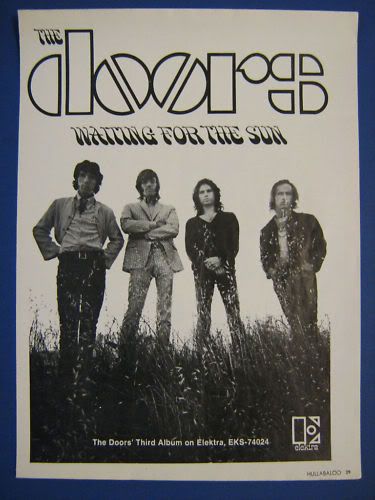 Advert from Hullaballoo magazine 1968 |
|
|
|
Post by TheWallsScreamedPoetry on Sept 29, 2011 9:04:10 GMT
|
|